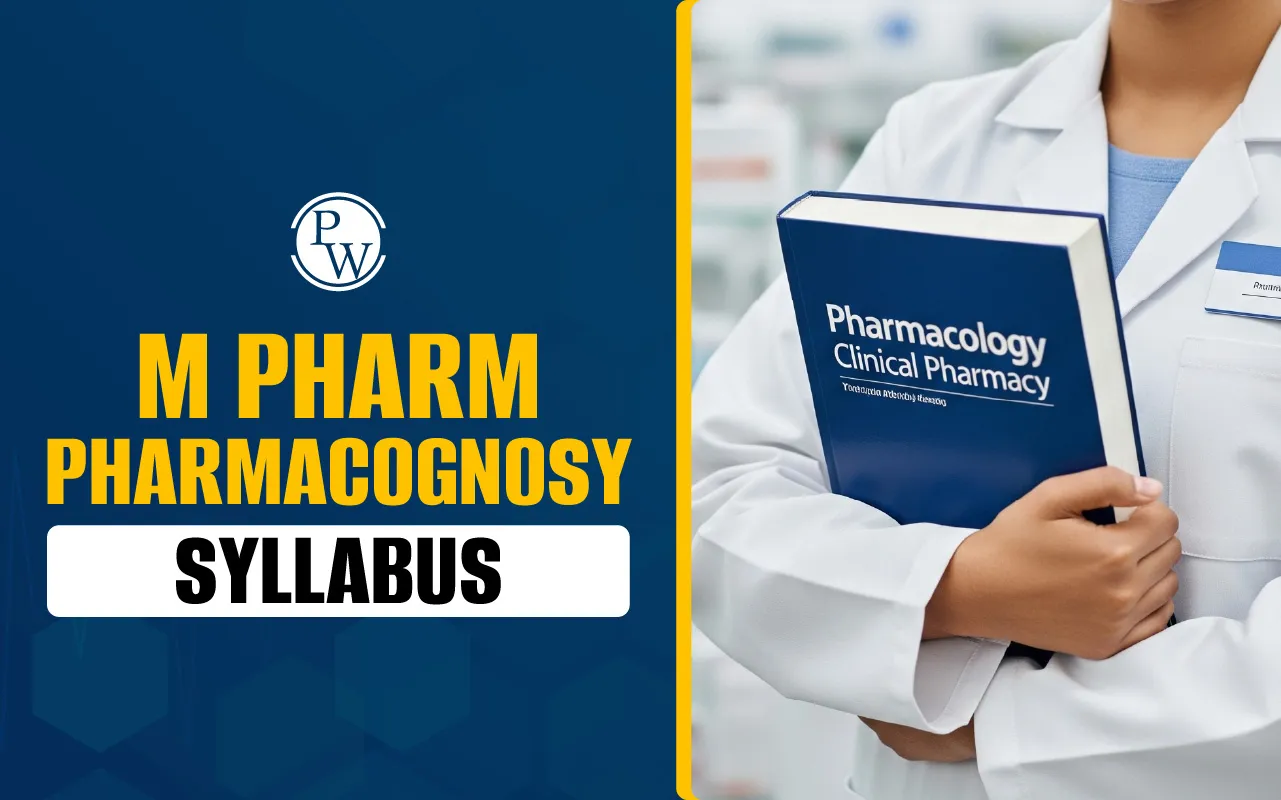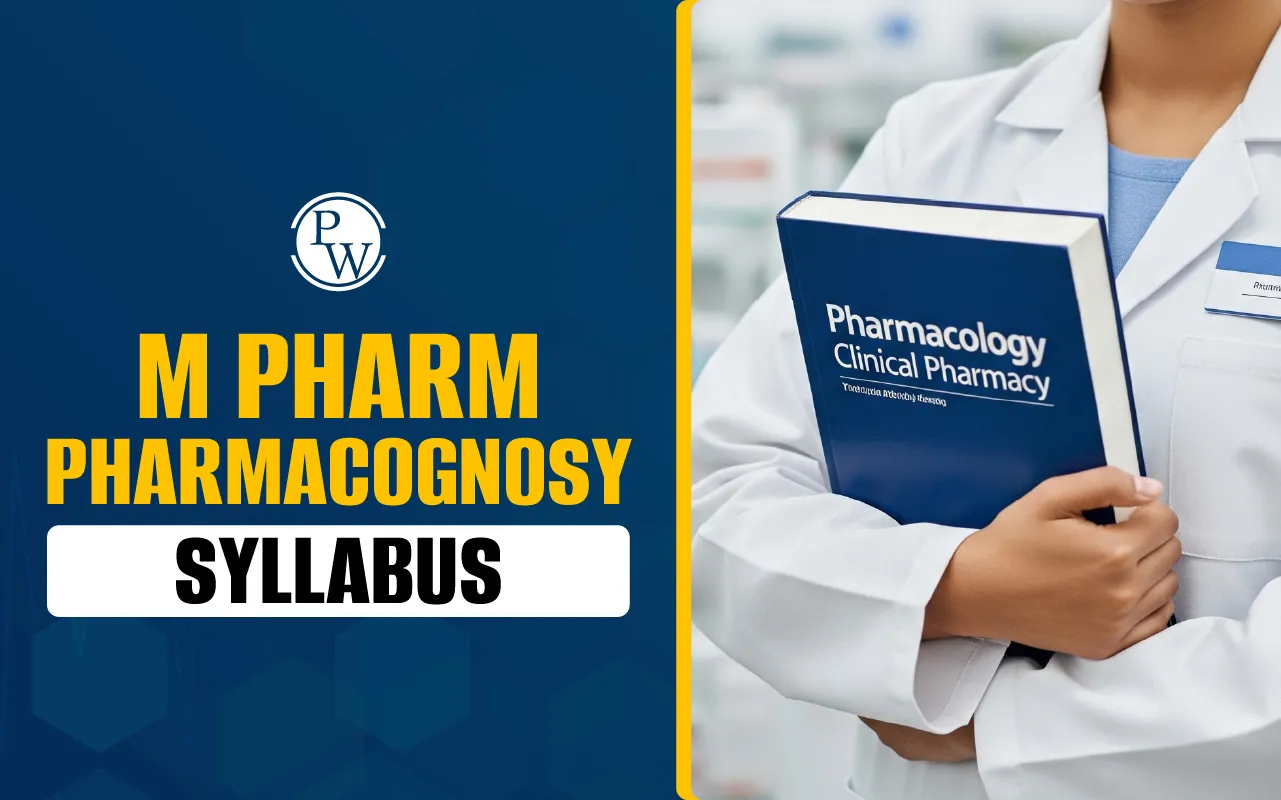

M Pharm Pharmacognosy Syllabus program includes aspects of the cultivation of medicinal plants, phytochemistry, advanced pharmacognosy, herbal drug standardization, and pharmaceutical analysis. It also includes subjects, such as biotechnology of medicinal plants, plant drug cultivation, quality assessment, ethnopharmacology, and industrial pharmacognosy.
Practical skills are also developed in laboratories and students learn modern analytical methods and other techniques used in the field, while the natural product drug discovery process, as well as the safety regulations, are emphasized.
M Pharm Pharmacognosy Syllabus Overview
M Pharm Pharmacognosy syllabus, approved by the Pharmacy Council of India (PCI), ensures that the program matches industry expectations and evolving scientific developments. Learners can download the official PCI-approved pharmacognosy syllabus PDF for a detailed guide. By enrolling in this course, students get a combination of theoretical concepts, rigorous practical training, and exposure to the latest trends in pharmacognosy.
| M.Pharm Pharmacognosy Syllabus Overview | |
| Particulars | Details |
| M.Pharm Pharmacognosy Course Duration | 2 Years |
| Official Website | Pharmacy Council of India (PCI): https://www.pci.nic.in/ |
| Syllabus overview | Based on B.Pharm course regulations (2024), includes: Herbal drugs, tissue culture, tannins, resins, carbohydrates, volatile oils, alkaloids, glycosides; more details via PCI/GPAT portal |
| Top Recruiting Companies | Roche, Pfizer, Aurobindo Pharma, Lupin Ltd., Dr Reddy's Laboratories, Alkem Lab, etc. |
| Job Profiles | Analytical R&D and Formulation Development, Quality Control or Regulatory Affairs Manager, Medical Writing |
M Pharm Pharmacognosy Syllabus PDF
M Pharm Pharmacognosy Syllabus can be accessed and downloaded from the PCI-approved pharmacognosy syllabus pdf from the official website. The PDF includes the pharmacognosy syllabus outline in a semester-wise manner with evaluation methods and marking scheme. Therefore, having a copy for yourself can help you plan for academic goals and in tracking your progress through each phase of the course. It is always important to refer back to the official file for the latest specifications and information.
For the convenience of students, we are providing PCI PCI-approved pharmacognosy syllabus PDF. Click the button below to download the PDF.
M Pharm Pharmacognosy Syllabus Semester-wise
M Pharma pharmacognosy syllabus is semester-based and covers fundamental up to advanced concepts across four semesters. Semester-wise pharmacognosy syllabus is broken down into distinct semesters, can be found below:
-
1st Semester- The focus of the 1st semester includes topics such as modern pharmaceutical analytical techniques, advanced pharmacognosy, phytochemistry, and pharmacognostical industrial technology. The 1st semester includes lab practicums, so the students are able to work on practical skills useful in research and product development.
-
2nd Semester- The focus of the 2nd semester includes medicinal plant biotechnology, advanced topics in pharmacognosy, the traditional Indian medicine system, and herbal cosmetics. Covering both the scientific topics, as well as, the traditional topics, gives students a more in-depth and appropriate understanding of pharmacognosy. The syllabus provides semester-wise pharmacognosy coverage that ensures there is a development of competency across semesters and is based on both theory and practice each semester.
M Pharm Pharmacognosy Subjects List
The M Pharm Pharmacognosy subjects list is carefully curated to address the industry’s key focus areas. These subjects not only provide factual knowledge but also focus on practical implementation, regulatory outlook, and advanced pharmacognosy topics in the syllabus, such as phytochemical extraction, natural product isolation, and biotechnological interventions in medicinal plants.
Here are a few core subjects included throughout the program:
-
Modern Pharmaceutical Analytical Techniques
-
Advanced Pharmacognosy I & II
-
Phytochemistry
-
Industrial Pharmacognostical Technology
-
Medicinal Plant Biotechnology
-
Indian System of Medicine
-
Herbal Cosmetics
M Pharm Pharmacognosy Practical Syllabus
The M Pharm Pharmacognosy practical syllabus allows each semester to have several laboratory sessions that are designed to concentrate on the student’s essential professional skills. Students are involved in the identification of crude drugs, phytochemical screening, extraction and isolation of the bioactive compounds, and validation of herbal products.
Additionally, the practical training includes industrial visits and case studies that link academic learning with industry needs. The practical syllabus prepares students to conduct experiments independently and to keep pace with current developments in the pharmacognosy syllabus and laboratory technology.
M Pharm Pharmacognosy Advanced Topics and Recent Advances
The M Pharm Pharmacognosy syllabus contains advanced pharmacognosy topics to keep students aligned with the latest scientific trends. Advanced pharmacognosy topics in the syllabus include plant tissue culture, biotransformation, utilization of modern instruments in quality control, and application of biotechnology in the pharmaceutical industry.
The syllabus also emphasizes ongoing research and recent advances in pharmacognosy syllabus, such as the development of herbal drugs, standardization of natural products, and exploring the use of DNA markers in plant authentication. By focusing on cutting-edge research, the program empowers students to contribute to innovative projects and pursue further studies in pharmacognosy.
M Pharm Pharmacognosy Project/Dissertation
The M Pharm Pharmacognosy syllabus contains a project/dissertation M Pharm pharmacognosy in the third and fourth semesters, which allows students to undertake original research under the supervision of faculty. Project/dissertation M Pharm pharmacognosy Topics may be selected from any area covered in the syllabus, such as novel herbal formulations, isolation of bioactive molecules, or quality assessment of medicinal plants.
Students are guided through research methodology, data analysis, and scientific communication. The dissertation component gives hands-on experience in advanced investigative techniques and instils problem-solving and critical thinking skills. This practical training forms a vital pillar of the M Pharm Pharmacognosy subjects list, preparing students for academia, research, or the pharmaceutical industry.
